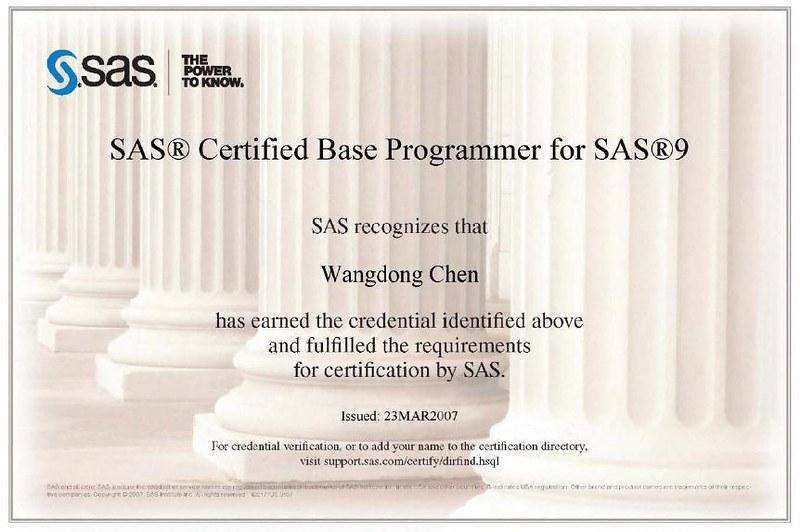Statistical analysis software (SAS) is a software that works with various data sources and creates statistical analyses. It’s popular in the data science and statistics fields.
If you are interested in SAS, knowing how to become a SAS programmer will help you get the desired job.
This guide will give an overview of SAS programmers and describe the career path to become a SAS programmer. I also list the vital skills for this job and answer some FAQs. Now let’s jump straight in!
Who Is a SAS Programmer? 4 Different Types
A SAS programmer is a highly skilled pro using the SAS suite for data analysis, manipulation, and reporting to turn raw data into valuable insights. There are several types of SAS programmers, each with a distinct focus and expertise:
- Clinical SAS programmer: These experts mainly work in healthcare and pharmaceuticals. They work with data from clinical trials and ensure it is correct.
- Statistical SAS programmer: These experts help statisticians analyze data for research by building models, running tests, and creating reports.
- Analyst programmer: These experts use SAS to analyze and transform data in different areas, like finance and retail. Then, they create software to meet the business requirements.
- Principal SAS programmer: These experts use advanced programming to create trial documents, data sets, and reports.

What Does A SAS Programmer Do?
Although each SAS programmer has a different set of duties depending on the industry and work environment, below is a list of what a SAS programmer typically does:
- Get data ready by cleaning and organizing it.
- Analyze data using SAS procedures to extract meaningful insights from data.
- Manage databases by setting up and organizing them to store data in an orderly way.
- Write and maintain SAS code to automate data processing and analysis.
- Check data to ensure the data is correct and doesn’t have mistakes.
- Make reports (with graphs and charts) to show what the data means.
- Help with clinical trials.
In short, SAS programmers are data experts who clean, study, and report on data using SAS. They help people make sense of data and use it to make decisions.
How To Become A SAS Programmer
Based on my experience and understanding of this career, I have compiled six steps to start and succeed in this profession most favorably. Let’s check!
1. Finish A Levels
Becoming a SAS programmer often begins with finishing your A levels, which are advanced high school qualifications in the UK. How many A levels you need and which subjects you should take vary depending on your chosen path.
College Degree
If you want to go to college, you typically need to complete 2 or 3 A levels. Some colleges might also ask for specific subjects like math, computer science (CS), or statistics.
Apprenticeship
Another way to become a SAS programmer is through an apprenticeship program. This program requires at least 1 A level, but having more will be helpful.
You’ll also need to have completed 4 or 5 GCSEs. The exact requirements can differ depending on the apprenticeship and the employer offering it.
2. Get A College Degree

After finishing A levels, the most common route is to earn a college degree. It will help you acquire the skills and knowledge needed for this job.
When looking for Bachelor’s degree programs, check if they include SAS or related topics in their courses. In this program, it’s a good idea to study the following subjects:
- Computer Science
- Statistics
- Data Science
- Math
- Software Development
These subjects give you a strong foundation for SAS programming and help you understand how to work with data and use SAS.
Some degrees offer advanced statistics courses. These are really helpful if you want to specialize in a particular industry as a SAS programmer. Advanced statistics is vital for deep data analysis.
You don’t have to stick to just one field. Degrees in engineering, physics, psychology, and economics can also be helpful. They bring unique perspectives and skills.
You can also check out combined degree programs that mix different subjects like math and biology. These will be valuable if you want to work in SAS programming roles that require knowledge in various areas.
3. Find An Apprenticeship (Optional)
Instead of college, you can get an education background to be a SAS programmer through an apprenticeship. It lets you learn by doing, and you get to use what you learn right away.
I recommend finding apprenticeships in computer programming or data science. Before choosing, read the course details carefully. Make sure it talks about training in SAS.
My recommendation is a Digital & Tech Solutions Specialist MSc Degree. It mixes classroom learning with real work experience, which is great for your career.
4. Get A SAS Certification

In a competitive job market, having a SAS certification makes you outstanding. Certification programs teach you a bunch of vital SAS skills. You’ll learn everything from basic data handling to advanced data analysis.
Currently, SAS offers different certifications. So, you can specialize in clinical trials, data science, or advanced analytics. Just pick what fits your career goals. Here are some popular SAS certifications:
- SAS Certified Base Programmer: It proves you have the basics of SAS, like working with data and doing simple analysis.
- SAS Certified Advanced Programmer: Building on the base certification, this one shows you’re really good at complex data work.
- SAS Certified Clinical Trials Programmer: This is for you if you’re into healthcare and drugs. It says you can use SAS for clinical trial data analysis.
- SAS Certified Data Scientist: This is for data nerds who love digging deep. It covers data analysis, machine learning, and other advanced knowledge.
- SAS Certified Statistical BA: If you like numbers and making business decisions, this one’s for you. It shows you can use SAS for stats and forecasting in business.
- SAS Certified Big Data Pro: If you’re into big data, this teaches you SAS skills for dealing with massive datasets.
- SAS Certified AI & ML Pro: It covers topics like deep learning, neural networks, and NLP.
- SAS Certified Visual BA: If you prefer pictures to numbers, this is about using SAS for visual data analysis and reporting.
- SAS Certified Predictive Modeler: If you like predicting the future with data, this one’s for you. It’s about using SAS for making forecasts.
- SAS Certified Specialist: ML Using SAS Viya: This focuses on using SAS Viya, a powerful analytics platform, for ML.
5. Gain Work Experience

Practical experience is the best way to enhance your skills and make you more appealing to potential employers. You can gain SAS work experience through these options:
- School projects: If you’re in school, you should join projects that use SAS. These projects mimic real work and help you learn SAS.
- Internships and entry jobs: You can start with internships or entry positions, like data analyst assistant, at companies using SAS. These roles teach you how to work with SAS software and analyze data.
- Freelance work: Consider doing SAS freelance work. You can find gigs online or through connections. Freelancing lets you work on different projects and build a portfolio.
- Volunteering: Nonprofits and community groups often need data help. You can offer your SAS skills for free to gain experience and give back.
- Online practice: Join online communities like Kaggle or enter data competitions. They provide datasets and challenges to help you practice SAS.
Gaining work experience takes time, but it helps you learn, practice, and show off your SAS skills for a great career.
6. Get A Master’s Degrees (Optional)

Getting a Master’s degree is an extra step you can take to become a skilled SAS programmer because it allows you to focus specifically on SAS programming after you’ve learned the basics in your earlier education.
With a Master’s degree, you can aim for higher-paying positions and even leadership roles in data analysis and SAS programming.
When choosing a Master’s degree program to learn, look for a well-known one in CS or data science. These programs cover the advanced skills you need for SAS programming.
One thing to note is that you must meet the academic requirements for these programs. They often want good grades in your Bachelor’s degree.
Required Skills

SAS Programming Skills
A SAS programmer needs coding skills, statistical knowledge, teamwork, logical thinking, attention to detail, openness to learning, industry knowledge, and data management skills.
- Coding skills: You need to be good at writing code. You will use SAS to work with data, so knowing how to write clean and error-free code is vital.
- Statistical analysis: You will work with data to find vital insights. So, you need to understand statistics to analyze data.
- Teamwork skills: You will often work with a team of other pros, like data analysts and experts in different fields. So, working and communicating well with others is crucial.
- Analysis and reasoning: You need to be good at solving problems and thinking logically. You will use these skills to find patterns and make sense of data.
- Attention to detail: Small mistakes can lead to big problems when working with data. So, you must be careful and pay close attention to the details.
- Adaptability: Things change in the world of data analysis. You need to be open to learning new things and using new tools.
- Domain knowledge: Depending on the industry you work in, you need to know specific things about that industry. For example, if you work in technology, you should understand technology data.
- Data management: SAS programmers deal with a lot of data. You must know how to store, organize, and clean data.
These skills help you work with data effectively and provide valuable insights to your teams and company.
Why Should You Become A SAS Programmer?
Being a SAS programmer offers good pay, job stability, the chance to make a difference, unique work, and career options.
- High pay: SAS programmers earn good salaries, with an average total pay range between $82,000 and $122,000 per year. Typically, the most common income falls around $100,000/year.
- Stable jobs: You will have secure jobs because data analysis is always needed in various industries.
- Positive impact: You can contribute to solving real-world problems and making a positive impact on many fields.
- Interesting work: It’s a unique job where you dive into complex data sets, uncover hidden trends, and develop innovative solutions.
- Many career options: You can work in different industries (healthcare, finance, marketing, research, and countless other sectors).
FAQs
Is Learning SAS Programming Easy?
Learning SAS programming is manageable. Base SAS is akin to SQL. So, if you’re familiar with SQL, learning base SAS is relatively straightforward.
Is SAS Programming A Good Career To Pursue??
Yes, SAS programming is a promising career choice. It offers good pay, job security, and opportunities in various industries.
What Are The Qualifications For SAS Programmers?
To become a SAS programmer, you typically need a Bachelor’s degree, knowledge of SAS tools, and skills in statistics and coding. Relevant certifications are also valuable.
How Much Time Does It Take To Learn SAS Programming?
Learning SAS programming time varies. Basic proficiency might take a few months while becoming advanced can take a year or more with consistent learning and practice.
Wrap Up
This guide above has provided six steps to start your SAS programming career. You need to get a good education and learn SAS.
To boost your confidence, I recommend being serious about getting certifications and experience. Don’t forget to stay updated on the latest in the field.
With dedication and these steps, you can start a promising career as a SAS programmer in the data analysis world. Thank you for reading!
